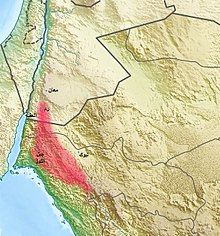Zayd ibn Ḥāritha al-Kalbī, was an early Muslim, Sahabi and the adopted son of the Islamic prophet, Muhammad. He is commonly regarded as the fourth person to have accepted Islam, after Muhammad's wife Khadija, Muhammad's cousin Ali, and Muhammad's close companion Abu Bakr. Zayd was a slave that Hakim ibn Hizam, Khadija's nephew, bought for her at a market in Ukaz. Zayd then became her and Muhammad’s adopted son. This father-son status was later annulled after Muhammad married Zayd’s ex-wife, Zaynab bint Jahsh.
The Muhajirun were the converts to Islam and the Islamic prophet Muhammad's advisors and relatives, who emigrated from Mecca to Medina, the event is known in Islam as the Hijra. The early Muslims from Medina are called the Ansar ("helpers").
Munzir ibn Sawa was the governor of the Persian Sasanian Empire of historical Bahrain, the eastern coast of the Arabian peninsula opposite of Tihamah.
When the Islamic prophet Muhammad initially spread Islam in his hometown, Mecca, he did not meet with any significant opposition from his tribesmen, the Quraysh. Rather, they were indifferent to his activities, as they did not appear to be particularly interested in devotional meetings. This was the case until Muhammad started attacking their beliefs, which caused tensions to arise. The Muslims then reportedly received persecution that lasted for twelve years beginning from the advent of Islam to Hijrah.
The diplomatic career of Muhammad encompasses Muhammad's leadership over the growing Muslim community (Ummah) in early Arabia and his correspondences with the rulers of other nations in and around Arabia. This period was marked by the change from the customs of the period of Jahiliyyah in pre-Islamic Arabia to an early Islamic system of governance, while also setting the defining principles of Islamic jurisprudence in accordance with Sharia and an Islamic theocracy.
Expedition of Amr ibn al-As, also known as the Campaign of Dhatas Salasil, took place in September 629 AD, 8AH, 6th month, of the Islamic Calendar.

Rayhana bint Zayd was a Jew from the Banu Nadir. Through marriage, she was also a part of the Banu Qurayza, another local Jewish tribe. During the siege of Banu Qurayza in 627, she was widowed and taken captive by the early Muslims and subsequently became a concubine or wife of Muhammad. Their relationship produced no children and ended with Rayhana's death in Medina in 631.

Dihya ibn Khalifa al-Kalbi, sometimes spelled Dahyah, was the envoy who delivered the Islamic prophet Muhammad's message to the Roman Emperor Heraclius.
The early Muslim–Meccan conflict refer to a series of raids in which the Islamic prophet Muhammad and his companions participated. The raids were generally offensive and carried out to gather intelligence or seize the trade goods of caravans financed by the Mushrik of the Quraysh. His followers were also impoverished. The raids were intended to harm the economy and in turn the offensive capabilities of Mecca by Muhammad. The Muslims felt that the raids were justified in that the items being sold in the caravans were their own items, stolen by the Meccans when they had fled to Medina.
The expedition against the Banu Saleem tribe, also known as the Al Kudr Invasion, occurred directly after the Battle of Badr in the year A.H. 2 of the Islamic calendar. The expedition was ordered by Muhammad after he received intelligence that the Banu Salim were planning to invade Madina.
The Al-Qarada raid was an event in early Islamic history which took place in Jumad at Thaniya, in the year 3 A.H of the Islamic calendar, i.e. November 624.
The Expedition of al Raji, occurred directly after the Battle of Uhud in the year AH 4 of the Islamic calendar.
The Massacre of Bi'r Ma'una, according to Islamic tradition, took place four months after the Battle of Uhud in the year A.H. 4 of the Islamic calendar. It is believed the Islamic prophet Muhammad sent missionaries to preach Islam, at the request of Abu Bara. Forty or seventy of the Muslim missionaries were killed.
Expedition of Zayd ibn Harithah in al-Jumum took place in September 627.
Expedition of Zayd ibn Harithah to Wadi al-Qura took place in November, 627AD, 7th month of 6AH of the Islamic calendar.
Raid of Sa'd ibn Zaid al-Ashhali, took place in January 630 AD, 8AH, 9th month, of the Islamic Calendar, in the vicinity of al-Mushallal. Sa'd ibn Zaid al-Ashhali was sent to demolish the images of the gods worshipped by the polytheist tribes around the area.
Expedition of Khalid ibn al-Walid, to Mecca, against Banu Jadhimah, took place in January 630 AD, 8AH, 9th month, of the Islamic Calendar.
Zayd bin al-Dathinnah was a companion of the Islamic Prophet Muhammad. He was killed during the Expedition of Al Raji. In 625 some men requested that Muhammad send instructors to teach them Islam, but the men were bribed by the two tribes of Khuzaymah who wanted revenge for the assassination of Khalid bin Sufyan by Muhammad's followers and they killed the Muslims
Amr bin Umayyah al-Damri was a companion of the Islamic Prophet Muhammad. Amr bin Umayyah al-Damri was sent to assassinate Abu Sufyan.
Banu Muzaina was an Arab tribe during the time of the Islamic prophet Muhammad. They were involved in the Expedition of Zayd ibn Harithah in September, 627 CE, 6AH of the Islamic calendar A platoon, under the leadership of Zaid bin Haritha, was sent to Al Jumum, the habitation of Banu Salim, in the same year. A group of non-muslims were captured. A woman from Banu Muzaina was also captured, and she showed them the way to the enemy's camp. The Banu Muzaina tribe was an Arab pagan tribe which later converted to Islam.




